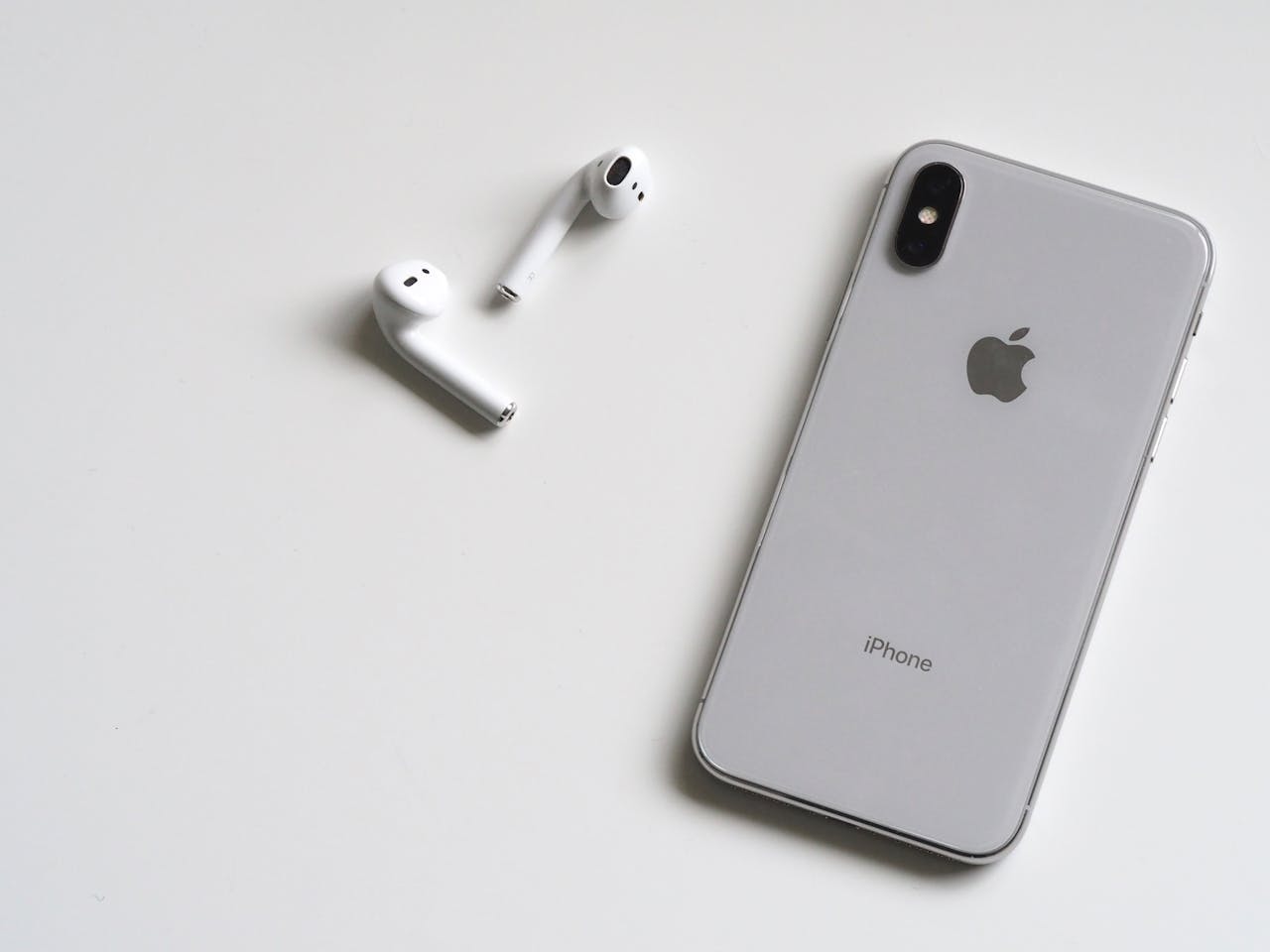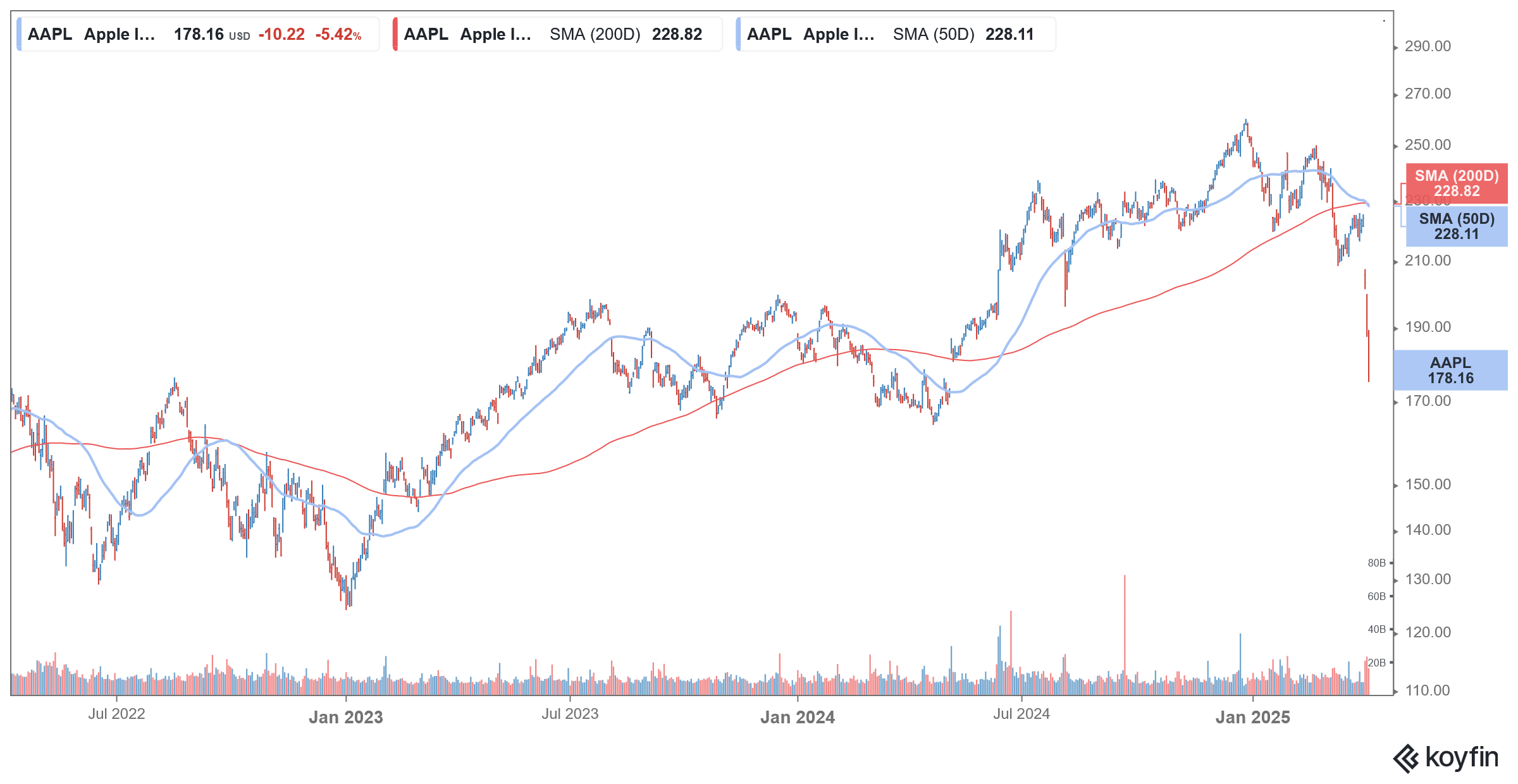
Apple shares are down over 5% today and are drifting towards their 52-week lows as US President Donald Trump threatened China with more tariffs if it does not remove the retaliatory 34% that it imposed on US goods.
Last week, Trump slapped a 34% tariff on Chinese imports as he imposed reciprocal tariffs on over 180 countries. Since he had already slapped Chinese products with a 20% levy earlier in his tenure, the total tariffs on Chinese exports to the US swelled to 54%.
Trump threatens China with more tariffs
While many countries are still contemplating their counter strategy to Trump’s tariffs, China went ahead and slapped a 34% tariff on imports from the US. Notably, Trump had previously warned countries not to retaliate against his tariffs and in a Truth Social post today he threatened China with another 50% tariff.
“If China does not withdraw its 34% increase above their already long term trading abuses by tomorrow, April 8th, 2025, the United States will impose ADDITIONAL Tariffs on China of 50%, effective April 9th. Additionally, all talks with China concerning their requested meetings with us will be terminated!” wrote Trump in his long post.
Moreover, the White House has denied that the Trump administration is considering a 90-day pause on tariffs. US markets initially rebounded on reports of a reprieve from the tariffs but have again turned red.
Apple share drifts towards 52-week lows
Meanwhile, Apple shares are drifting towards a 52-week low today. The company sources the bulk of its goods from China and is seen as among the worst hit from Trump’s tariffs. According to Rosenblatt Securities, iPhone prices could rise by around 43% from the tariffs. The brokerage estimates that the price of iPhone 16 Pro Max would rise to around $2,300 up from $1,599 that it currently costs while the cheapest iPhone price could rise from $799 to $1,142.
Notably, companies like Apple would either need to raise product prices and pass on the tariffs to customers. Alternatively, they would need to absorb them – either fully or partially. Companies would be hard pressed between the two options and risk losing some sales or take a hit on their margins.
In one of his previous interviews, Trump said that he cannot “guarantee” that his tariffs won’t hurt Americans. Even the legendary Warren Buffett took a swipe at the tariffs saying, “Over time, they are a tax on goods. I mean, the tooth fairy doesn’t pay ’em!”
Tariffs set to impact Apple’s earnings
While Apple has gradually diversified its supply chain to countries like India and Vietnam, China is still its biggest sourcing destination. Wedbush Securities analyst Dan Ives estimates that 90% of iPhones are made in China. Similarly, he estimates that over 50% of Mac products and between 75% and 80% of its iPads are produced in the Communist country.
Ives sees tariffs hitting Apple’s sales and said in his note, “For U.S. consumers the reality of a $1,000 iPhone being one of the best made consumer products on the planet would disappear.”
He added, “Price points would move up so dramatically it’s hard to comprehend and the near-term margin impact on Apple’s gross margins during this tariff war could be mind boggling.”
“This tariff situation is dramatically different and a very scary prospect as the current tariff slate with China at 54% and Taiwan at 32% would be devastating to Apple, its cost structure and ultimately consumer demand,” warned Ives in his note.
Apple has been losing market share in China
Apple has been gradually losing market share in China as domestic smartphone companies, especially Huawei whose business suffered a near-death blow due to the US sanctions, have come up with attractive offerings. Last year, Apple lost its market leading position in the Chinese smartphone market to Vivo.
Growing US-China tensions are a potential risk for Apple investors. US-China relations which were anyways at the lowest level in decades have deteriorated further amid the trade war.
For Apple, China is a major market and also a sourcing hub. In the past also, the company has faced boycott calls in China. However, it downplayed the risks and said that it did not have a material impact on sales. While Apple has been trying to diversify its supplier base after the US-China trade war, the company still heavily relies on Chinese suppliers.
During the most recent earnings call, Apple dodged questions over its supply chain strategy in light of Trump’s tariff threat.
Recession fears rise
Meanwhile, economists have raised the odds of a US recession amid Trump’s reciprocal tariffs. JPMorgan chairman Jamie Dimon has joined the chorus and wrote in his annual letter, “Whatever you think of the legitimate reasons for the newly announced tariffs – and, of course, there are some – or the long-term effect, good or bad, there are likely to be important short-term effects.”
He added, “We are likely to see inflationary outcomes, not only on imported goods but on domestic prices, as input costs rise and demand increases on domestic products.”
Fed chair Jerome Powell has also signaled a wait and watch approach to future rate cuts citing potential inflationary impact from Trump’s tariffs.
Speaking at a business journalism conference in Arlington, Va. Powell said, “Higher tariffs will be working their way through our economy and are likely to raise inflation in coming quarters.”
He added, “The size and duration of these effects remain uncertain. While tariffs are highly likely to generate at least a temporary rise in inflation, it is also possible that the effects could be more persistent.”
Trump meanwhile called upon Powell to slash interest rates and said in a Truth Social post, “This would be a PERFECT time for Fed Chairman Jerome Powell to cut interest Rates. He is always ‘late,’ but now he could change his image, and quickly.”
Fow now though, US shares continue to reel under the impact of Trump’s tariffs with the S&P 500 also joining its tech heavy counterpart Nasdaq Composite into a bear market.


Question & Answers (0)